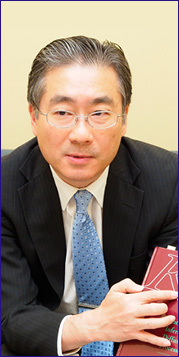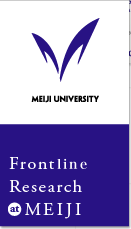

Whether it be Economics, Science and Engineering, Medicine, Psychology, Fluid Mechanics, Astronomy, Meteorology, or Other Fields—Statistics is There
About twenty years ago, I worked at a brokerage firm while attending graduate school, conducting research at The Institute of Statistical Mathematics under the former Ministry of Education. At the time, I was beginning research on a probability distribution model capable of accurately assessing financial risk, and I have continued with this research until the present.The accuracy of risk assessment relies heavily on probability distribution from target data. Back then, bell-shaped normal distribution was dominant in the financial world, but because financial data related to factors such as stock prices and exchange rates features skew and leptokurtic, I felt that a new probability distribution approach was needed as a basis for risk management. After starting my studies at Meiji University, I utilized the large amounts of random numbers generated from probability distribution system (comprising collections of probability distributions) to create a new approach boasting diversity that was hard to achieve using conventional analytical approaches, realizing a method for constructing optimized models from data. High-order correlation like skewness and kurtosis became possible using this method, enabling more accurate understanding of target data distribution characteristics. Because vast numbers of calculations using a supercomputer were necessary to perform research using this type of random-number probability distribution, this research was only possible due to advances in parallel processing and other computing technologies that enabled calculation speed increases.
This form of probability distribution is not only applied in finance, but also utilized at universities and research institutions and cited in research papers in the fields of science and engineering, medicine, psychology, fluid mechanics, astronomy, meteorology, and a variety of others. I hope that its continued use will return further benefits to society. My random-number probability distribution has been patented in both Japan and the United States—it is extremely rare for a Japanese person to be awarded an American financial engineering patent. I would like this model to become the standard risk management model used by regulators, financial institutions, and other such organizations throughout the world.
Writing Research Papers in English and Giving Back to Society through Research Results—A Paper I Wrote during my Graduate Student Days was Featured in an International Academic Journal Fifteen Years After I Finished My Graduate Studies!
A series of my research results have been published as English-language research papers in various international academic journals including those for the International Association for Statistical Computing (IASC), the American Chemical Society (ACS), and the Institute of Electrical and Electronics Engineers (IEEE), and my writing has been cited in research papers in various foreign countries. I hope that all graduate students will write their academic papers in English in consideration of globalization while striving to return the benefits of their research results to society. During my graduate student days I wrote a paper in English and published it in an English-language academic society journal in Japan, and 15 years later (recently) it was featured in an international-level academic journal on financial engineering. In addition, my dissertation on statistics was mentioned in an English-language textbook. In other words, you never know when or from whom your research results will attract attention, so it is important to start communicating your ideas in English from graduate school onward so they can reach as many readers as possible.In addition, you should understand that the research you perform in graduate school is an important part of your career as a researcher. The research of many Nobel Prize laureates in economics is a continuation of what they started in graduate school. Furthermore, I encourage you to utilize research results as intellectual property for books, scholarly papers, and other published works, as well as for patents and other means of giving back to society. Statistics is an academic field with deep ties to society, and I believe it is important to consider how your results can be useful to society when conducting research. When the role of statistics in society is examined, the history of statistical science and the thought produced therein prove to be of great value.
Acquiring Scientific Literacy and Asking Yourself “Why?”
In addition to undergraduate and graduate students, I want as many people as possible to become scientifically literate. During the first class I teach to university students, I ask them the question “why does the sun shine?” Only a few students answer correctly: hydrogen nuclei in the core of the sun undergo fusion, which changes them changed into helium nuclei, releasing large amounts of heat and light are released that make sun shine. The sun is necessary for human beings to live, yet few of them have wondered why the sun shines or taken the time to research the cause, which is a major problem.As we continue to think about issues related to energy, the environment, and other areas, the scientific knowledge that serves as a foundation for all of these is indispensable. Experiments are particularly important today, an era in which virtualization have become too prominent. In the future, with scientific knowledge and thinking as important bases throughout society, it is likely that the ability to formulate one’s own problems to ask oneself “why?,” as well as the logical and cognitive capabilities to pursue the answers to such questions, will become necessary.
In reality, statistics is a field with deep ties to society. Statistical analysis is utilized in weather forecasting, prediction of earthquakes, and other such functions that directly affect our lives, and it is also used in quality control at factories, marketing, and other applications. It is my hope that many people throughout society will become aware of the usefulness of statistics, and that the number of students who wish to study in the field will increase.
Profile
Professor, Graduate School of Political Science and Economics, Meiji UniversitySpecialization in economics
Born in Tokyo in 1961. Graduated from The University of Tokyo Faculty of Engineering in 1984, completed his master’s degree at the University of Tsukuba Graduate School in 1992, and completed the doctoral program and took a Ph.D. at The Graduate University for Advanced Studies (SOKENDAI) in 1996. Worked in IBM Japan and Nikko Securities. Served as a full-time lecturer in Meiji University from 1997 and an associate professor from 2000, and took on his current position in 2005. His writings have been published numerous times in international academic journals and Japanese research papers. Major works include Kinyu Kogaku Jiten (“Dictionary of Financial Engineering,” collaborative work published by Asakura Publishing).









